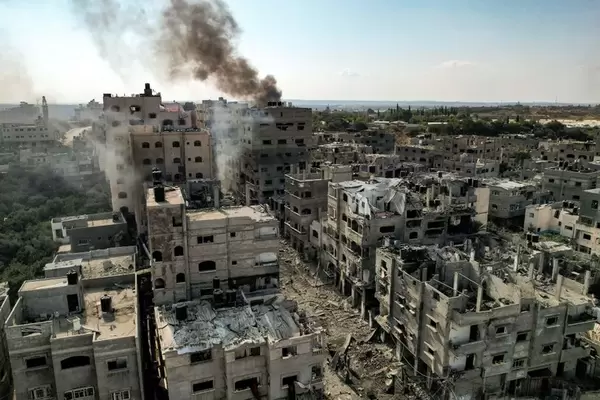Israeli airstrikes continued Monday to rain misery across the Gaza Strip, the Hamas-ruled Palestinian territory where people haven’t had enough food or clean water since bombs started falling on Oct. 7 in response to Hamas’ brutal terror rampage in southern Israel. The White House said Sunday that Israel had agreed to allow a “continued flow of assistance” into Gaza after more than two weeks of a complete blockade cut the Palestinian enclave’s roughly 2.3 million inhabitants — half of whom are children — off from supplies of food, water, electricity and fuel.
It was becoming increasingly clear Monday that the U.S. wants Israel to not only allow more humanitarian assistance into Gaza, but for the country to let ongoing negotiations over the release of hostages held by Hamas to continue before it launches a ground invasion of the Palestinian territory. Israel said Monday that Hamas was still holding 222 people captive.
Two sources told CBS News the U.S. has sought to slow Israel’s plans for a ground invasion in order to prioritize the release of hostages and the distribution of aid, a message Washington is said to have been conveying primarily through defense channels.
But while desperately needed aid finally started trickling across the Egyptian border into southern Gaza over the weekend — at least 54 trucks had crossed as of Monday morning — the United Nations estimated that at least 100 trucks would need to cross daily just to meet peoples’ basic needs amid an unprecedented humanitarian crisis.
Mohsen Sarhan, CEO of Egyptian Food Bank, told CBS New he’s responsible for half of the aid trucks that have crossed into Gaza at the Rafah crossing.
“It’s much, much smaller than a drop in the ocean… because there were a lot more trucks crossing the border before that,” he says, referring to the dozens of aid trucks that crossed on a daily basis before the conflict began on Oct. 7.
When asked about President Biden and Israeli Prime Minister Benjamin Netanyahu saying Sunday that there would now be “a continued flow,” he said he’s been “seeing signs that this is moving in the right direction.”
“So we know now it’s about the capacity of the Palestinian side to absorb trucks,” he told CBS News.
Prior to this weekend, he says the passage of the trucks was hampered by Israeli airstrikes.
“We were stationed right at the gates with the crossing, but the Egyptian authorities wouldn’t let us in because while we were attempting that, every half an hour, at least three or four rockets were being dropped less than one kilometer from where we are.”

